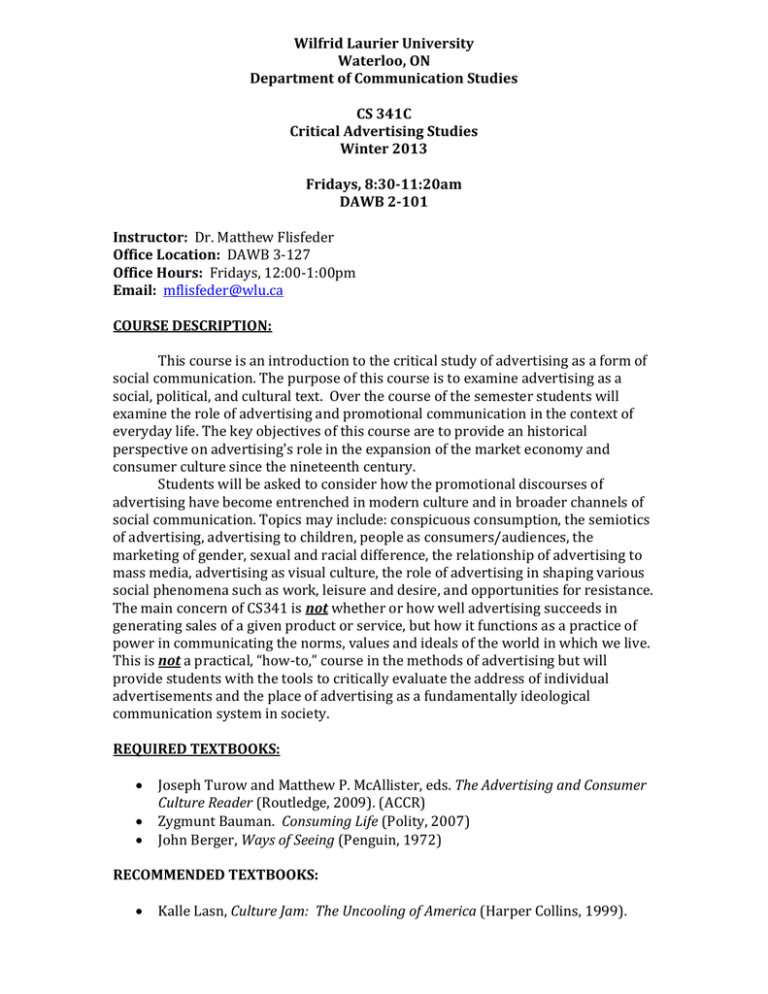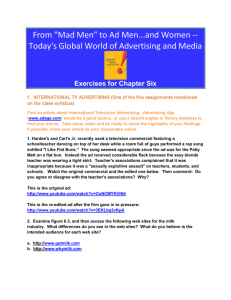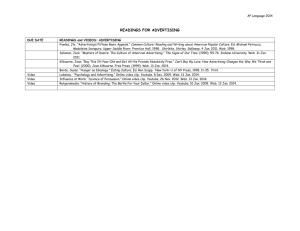Wilfrid Laurier University Waterloo, ON Department of
advertisement

Wilfrid Laurier University Waterloo, ON Department of Communication Studies CS 341C Critical Advertising Studies Winter 2013 Fridays, 8:30-11:20am DAWB 2-101 Instructor: Dr. Matthew Flisfeder Office Location: DAWB 3-127 Office Hours: Fridays, 12:00-1:00pm Email: mflisfeder@wlu.ca COURSE DESCRIPTION: This course is an introduction to the critical study of advertising as a form of social communication. The purpose of this course is to examine advertising as a social, political, and cultural text. Over the course of the semester students will examine the role of advertising and promotional communication in the context of everyday life. The key objectives of this course are to provide an historical perspective on advertising's role in the expansion of the market economy and consumer culture since the nineteenth century. Students will be asked to consider how the promotional discourses of advertising have become entrenched in modern culture and in broader channels of social communication. Topics may include: conspicuous consumption, the semiotics of advertising, advertising to children, people as consumers/audiences, the marketing of gender, sexual and racial difference, the relationship of advertising to mass media, advertising as visual culture, the role of advertising in shaping various social phenomena such as work, leisure and desire, and opportunities for resistance. The main concern of CS341 is not whether or how well advertising succeeds in generating sales of a given product or service, but how it functions as a practice of power in communicating the norms, values and ideals of the world in which we live. This is not a practical, “how-to,” course in the methods of advertising but will provide students with the tools to critically evaluate the address of individual advertisements and the place of advertising as a fundamentally ideological communication system in society. REQUIRED TEXTBOOKS: Joseph Turow and Matthew P. McAllister, eds. The Advertising and Consumer Culture Reader (Routledge, 2009). (ACCR) Zygmunt Bauman. Consuming Life (Polity, 2007) John Berger, Ways of Seeing (Penguin, 1972) RECOMMENDED TEXTBOOKS: Kalle Lasn, Culture Jam: The Uncooling of America (Harper Collins, 1999). Joseph Heath and Andrew Potter, The Rebel Sell: Why the Culture Can’t Be Jammed (Harper Collins, 2004). SUPPLEMENTARY MATERIALS AVAILABLE ON MY LEARNING SPACE Deconstructing an Advertisement Deconstructing a Video Advertisement Advertising: Industry Exposure and Statistics COURSE ASSIGNMENTS/EVALUATION: Assignment In-Class Ad Analysis #1 In-Class Ad Analysis # 2 Final Essay Final Exam Participation Due Date February 1st, 2013 March 8th, 2013 March 22nd, 2013 TBA Cumulative Grade Value 10% 15% 35% 30% 10% *Details for final essay will be distributed on a separate handout Participation You are expected to attend classes regularly, and be prepared to make informed contributions to class discussions, having completed assigned readings prior to the classes for which they are assigned. Participation is also based upon timely and appropriate submission of assignments and appreciable endeavours to improve academic and learning skills. This mark does not include attendance, however, poor attendance will result in a lower participation mark. POLICY ON LATE ASSIGNMENTS All assignments are due at the beginning of class. Late assignments will be deducted one mark per day (off of your final grade). Students should submit late assignments (hard copy) by email for time/date verification only. Hard copies must be submitted the day following the submission of a digital copy. A hard copy of your assignment is required for grading. Late assignments will not be accepted one week after the scheduled due date (unless there is a legitimate reason, which will require official documentation). Extensions: If you feel that you might need an extension on an assignment, please speak with me at least one week prior to the assignment deadline. Granting of extensions is solely at the discretion of your Professor, and only if, after speaking with me, I feel that your reason for needing an extension is justified. Otherwise, extensions will be granted only under extenuating circumstances, in which case official documentation will be required in order to justify the submission of a late assignment. Extensions will not be granted after the deadline has already passed. CLASS CONDUCT AND EXPECTATIONS You are expected to conduct yourself in a manner respectful of your instructor and your fellow students. This includes, at a minimum: Arriving on time Turning off your cell phone upon arrival If late, entering the classroom with the least disruption Not interrupting or speaking when someone else has the floor Using your laptop appropriately (i.e. not for email) EMAIL I will only respond to email on regular weekdays, before 5pm. You must use your Laurier email account when sending emails. I will only respond to emails sent from a Laurier email account. Please review the course outline and My Learning Space before asking questions by email. I will not respond to email questions if the answers can easily be found in course materials. Please keep emails short. A long email indicates that it might be a better idea to make an appointment to see me during my office hours. I will not respond to mark/grade inquiries by email. WEEKLY CLASS SCHEDULE: January 11th: Course Introductions/The Commodity Readings: Joseph Turow and Matthew P. McAllister, “General Introduction: Thinking Critically About Advertising and Consumer Culture” (ACCR) Screening: The Persuaders January 18th: Advertising and Consumer Society Readings: Sut Jhally, “Advertising at the Edge of the Apocalypse” (ACCR) Gary Cross, “A New Consumerism, 1960-1980” (ACCR) Screening: Advertising and the End of the World January 25th: The Commodity and Commodity Fetishism Readings: Karl Marx, “Commodity Fetishism and Its Secret” Online http://www.marxists.org/archive/marx/works/1867-c1/ch01.htm#S4 Raymond Williams, “Advertising: The Magic System” (ACCR) Michael Schudson, “Advertising as Capitalist Realism” (ACCR) Screening: No Logo February 1st: Corporations: Situating Advertising in Big Business *In-Class Advertising Analysis # 1 at the Beginning of Class Readings: Susan Strasser, “The Alien Past: Consumer Culture in Historical Perspective” (ACCR) Stuart Ewen, “Educate the Public!” (ACCR) Greg Dickinson, “Selling Democracy: Consumer Culture and Citizenship in the Wake of September 11” (ACCR) Screening: The Corporation February 8th: Censorship and Ideology in Advertising Readings: Jef I. Richards and John H. Murphy, II, “Economic Censorship and Free Speech: The Circle of Communication Between Advertisers, Media, and Consumers” (ACCR) Aidan Kelly, Katrina Lawlor, and Stephanie O’Donohoe, “Encoding Advertisements: The Creative Perspective” (ACCR) Ben H. Bagdikian, “Dr. Brandreth Has Gone to Harvard” (ACCR) Screening: Wal-Mart: The High Cost of Low Price February 15th: Media Old and New – Grabbing Our Attention Readings: Berger, Ways of Seeing, Chapters One and Two Mark Andrejevic, “The Work of Being Watched: Interactive Media and the Exploitation of Self-Disclosure” (ACCR) Joseph Turow, “Advertisers and Audience Autonomy at the End of Television” (ACCR) Devin Leonard, “Nightmare on Madison Avenue: Media Fragmentation, Recession, Fed-Up Clients, TiVo – It’s All Trouble, and the Ad Business is Caught Up in the Wake” (ACCR) Screening: Behind the Screens February 22nd: READING WEEK – NO CLASS March 1st: Representations of Beauty Readings: Bauman, Consuming Life, Introduction and Chapter One: Consumerism Versus Consumption Berger, Ways of Seeing, Chapters Three and Four Inger L. Stole, “Televised Consumption: Women, Advertisers and the Early Daytime Television Industry” (ACCR) Katherine Frith, Ping Shaw, and Hong Cheng, “The Construction of Beauty: A Cross-Cultural Analysis of Women’s Magazine Advertising” (ACCR) Screening: Killing Us Softly 4 March 8th: Representing Race and Sexuality *In-Class Advertising Analysis # 2 at the Beginning of Class Readings: Bauman, Consuming Life, Chapter Two: Society of Consumers Elizabeth A. Smith and Ruth E. Malone, “The Outing of Philip Morris: Advertising to Gay Men” (ACCR) Eric King Watts and Mark P. Orbe, “The Spectacular Consumption of ‘True’ African American Culture: ‘Whassup’ With the Budweiser Guys?” (ACCR) J. Robyn Goodman, “Flabless is Fabulous: How Latina and Anglo Women Read And Incorporate the Excessively Thin Body Ideal Into Everyday Experience” (ACCR) March 15th: Selling to Children and Teens Readings: Naomi Klein, “Local Foreign Policy: Students and Communities Join the Fray.” (ACCR) James B. Twitchell, “Reflections and Reviews: An English Teacher Looks at Branding” (ACCR) Gary Ruskin and Juliet Schor, “Every Nook and Cranny: The Dangerous Spread of Commercialized Culture” (ACCR) Matthew P. McAllister and J. Matt Giglio, “The Commodity Flow of U.S. Children’s Television” (ACCR) Screening: Merchants of Cool March 22nd: ‘Failed Consumers’ *Final Essays Due at the Beginning of Class Readings: Bauman, Consuming Life, Chapter Three: Consumerist Culture and Chapter Four: Collateral Casualties of Consumerism Berger, Ways of Seeing, Chapters Five and Six Screening: Overspent American March 29th: Good Friday (no class) April 5th: The Politics of Advertising Readings: Berger, Ways of Seeing, Chapter Seven Maitrayee Chaudhuri, “Gender and Advertisements: The Rhetoric of Globalization” Robert Goldman and Stephen Papson, “Just Do It,” But Not on my Planet” Bruce W. Hardy, “Political Advertising in US Presidential Campaigns: Messages, Targeting, and Effects” Christine Harold, “Pranking Rhetoric: ‘Culture Jamming’ as Media Activism” Screening: This Land is Our Land: The Fight to Reclaim the Commons April 8th: Final Exam Review



